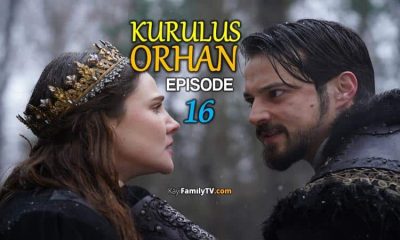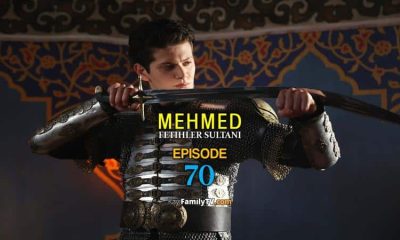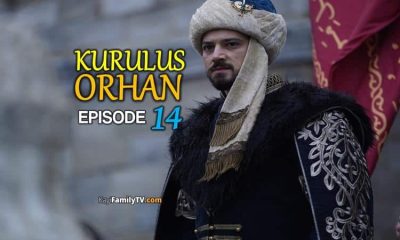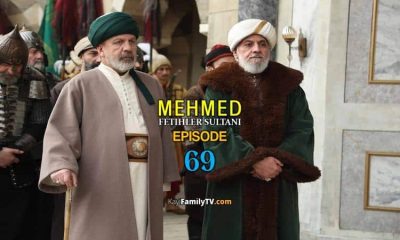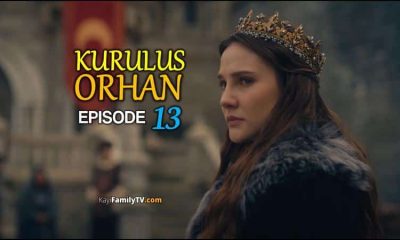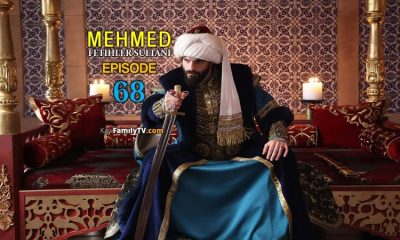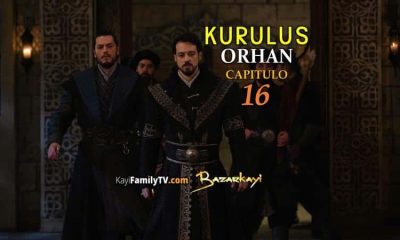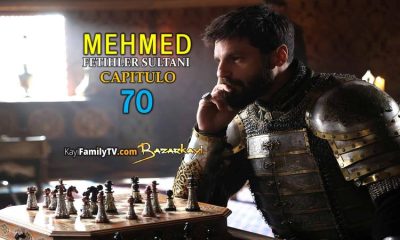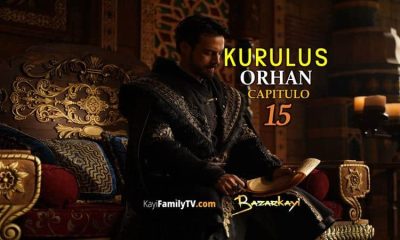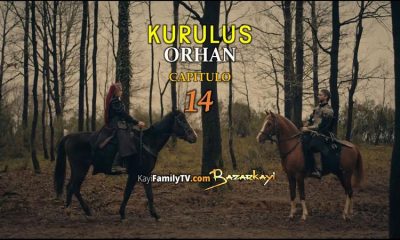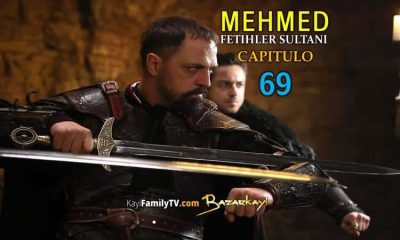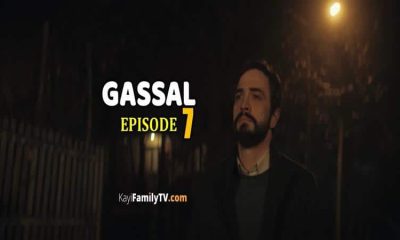HACI BAYRAM VELi
HACI BAYRAM VELI EPISODE 13
HACI BAYRAM VELI EPISODE 13 WITH ENGLISH SUBTITLES FOR FREE! HACI BAYRAM VELI SEASON 1 EPISODE 13
Numan, who was invited to Bursa, was appointed as Kapucubaşı (Personal Advisor to the Sultan) after teaching in the madrasah for many years. He is burned by the love of seeking Al-Haqq within himself. He decides to set off on a journey of reunion to find” himself and his Sheik.
HACI BAYRAM VELI EPISODE 13 – [READ THE “TRANSLATOR’S NOTES” BELOW THE VIDEO FOR EXPLANATIONS]
13th PAGE OF THIS JOURNEY
DONATE MELISA DIRILISH TRANSLATION
Translator’s Notes:
Some explanations regarding a few lines in episode 13.
Some lines in episode 13 Hacı Bayram Veli, required more explanation to be understandable, most notably the verses of Yunus Emre and Niyaz-i Misri, as well as some Sufi symbolism.
Since even with the greatest effort, the timing of these particular subtitles did not allow entering more information below the lines, I decided to write this information as side notes and to post it in the form of an accompanying article.
For each line bellow, I also stated the time at which it can be found in the video.
1.) The line @ 00:10:16
“With all this existence, sadness would not leave my heart.”
(the Truth won’t manifest in one’s heart)
[by Yunus Emre]
What Yunus meant by this verse is that a person’s peace and happiness depends on establishing order within himself and on relieving himself of everything that burdens his “Self”. Many people become anxious, depressed and restless because they cannot establish that peace and order in their inner world.
Because, the real cause of person’s troubles and hardships in his earthly life is actually the surrounding existence (material things, other beings, beauties of the world, etc …). This World (Dunya) is a world of contradictions and a place of possibilities. Good and bad, beautiful and ugly, right and wrong are tightly intertwined. As we dedicate our lives to achieving many things (success, titles, properties, and so on), we become attached to them. When we attach ourselves to these things, then our expectations grow, and so do our disappointments. That in turn causes tension and anxiety in a person. As a result and a person get distracted and forget about his/her real “Self”.
Yunus’ message in this verse is that peace is the fruit of inner balance, and that if you distance yourself from all that and leave everything at the discretion of Allah, the Truth will manifest itself in your heart, you will achieve inner peace and balance, and there will be no problems in your life that you will not be able to deal with. And only peaceful people with inner balance can be free and honest both to themselves and to those around them.
2.) The line @ 00:29:31
With the sign received from my ancestor Al-Mujtaba (“The Selected One”)…
[EmIr Sultan – direct descendant of Prophet,
pbuh, through his daughter Fatima Zahra]
This line refers to the dream that Emir Sultan [Muhammed bin Ali al-Huseyni al-Bukhari] had at a very young age.
In that dream he saw Prophet Muhammed (pbuh) and Hadrat Ali (ra) sitting side by side. He was then counselled that he was chosen to go to Anatolia, with the following words:
“O My Son! It has been pointed out to you by Almighty Allah to go to the Land of Rum (Anatolia) to teach the Sunnah of your ancestor Muhammad (pbuh) through Taqwaa. Three lamps will appear in front of you and you will follow them; and in whichever place those lamps disappear from your sight, you will remain there. And your grave will be there too.”
When Emir Sultan waked up from his sleep, he found the three lamps with bright burning flames in front of him and he said: “So that’s what Allah has decreed for me.” Upon that he left his home that very day and followed the lamps on foot. The journey took weeks and one day the lamps suddenly went out. As Hadrat Ali (ra) said, the three lamps have guided him, and eventually brought him to Bursa, where he stayed till the end of his days.
Emir Sultan, was a scholar of Tafsir, Hadith, Theology, he was a Divan poet and a mystic. His real name was Muhammed bin Ali al-Huseyni al-Bukhari and his title was Shamseddin. His lineage goes back to the Prophet (pbuh), through Prophet’s daughter Fatima Zahra. He was called Muhammed Bukhari because he was born in Bukhara, Emir Bukhari because he was a Sayyid, and after he became Yıldırım Beyazıt Khan’s son-in-law, he was called Emir Sultan.
Al-Mujtaba – meaning “The Selected One” or “The Chosen One among many.” It is a title of the Nabi (Prophet) Muhammad, which was also granted to his grandson, the Caliph Al-Hasan ibn ‘Ali.
3.) The line @ 00:45:10
“What they call being a dervish is not about a Hırka and a Taj.”
“Being a dervish is about making the heart flourish, not wearing a Hırka.”
[by Yunus Emre]
What Yunus meant by this couplet is that a Dervish-hood, that is being a Dervish, is not a collection of ceremonies consisting of soulless shapes and some symbols and movements that have no depth of meaning. Being a dervish is all about making one’s heart flourish.
As it is commanded in a Hadîth-i-Sherîf:
“Verily, Allah does not look at your bodies and forms; but he casts an evil eye on your hearts.” (Muslim, Birr, 33)
In this respect, appearance and attire do not make the person a Dervish. Because ingenuity and grace is not in the dervish’s Hırka [Dervish’s coat], Taj [Dervish’s headdress] or any other symbolic items, it is in his heart.
4.) The line @ 00:45:49
“The service of the dervish to his Murshid (guide, mentor) is wonderful.”
“You don’t need to be a Sultan (ref. to Selim Yavuz) to lay your head on the doorstep.”
[to endure hardship, even if trampled underfoot]
[by Niyaz-i Misri]
The 1st verse of this couplet implies that being a Murshid’s follower (dervish) is so beautiful, that it is worth enduring all the hardships and difficulties dervishes encounter on their path (the 2nd verse).
Niyaz-i Misri masterfully managed to incorporate three things in the 2nd verse of this couplet. That is: a Dervish’s hardships, plus one of the practices of the Bektashi Order, as well as the story about Sultan Selim’s earring.
First of all, “the doorstep” – it refers to one of the many meanings of the word “dervish” (originally from Persian), and that meaning is “the doorstep”. And in Sufism, in which one word carries the whole lesson, it expresses that a “dervish must endure all the hardships he would face, even if it means being trampled on, as a house ‘doorstep’ is trampled on.”
Secondly,” to lay your head (on doorstep)” – it refers to the practice of the Order of Hajji Bektashi Veli to pierce the ears of the aspiring dervish candidates. At the entrance to the Lodge (Dergah, Tekke), after the necessary advices would have been given to those who wished to join the Order, a dervish candidate would lay down his head, have a hole made in his ear and an earring would be inserted. One of the conditions of the sect was that the candidates would never marry. For those who would later break this rule, their earrings would be ripped out of their ears and they would walk around with a torn ear.
And thirdly, “a Sultan” – it refers to the earring of Sultan Selim Yavuz. This implies that even if you are a great Sultan, humility and respect should always be shown. The earring in the left ear of Sultan Selim Yavuz, one of the greatest Ottoman Sultans, is known as one of the symbols of this Bektashi order, as well as it symbolises the Sultan’s support of the Order. It is said that Sultan Selim went to the Lodge and ‘laid his head’ on its doorstep and had the Sheikh pierce his ear. The earring in question can be seen dangling from Sultan Selim’s left ear in many of his portraits.
• Additional notes regarding this verses from Niyaz-i Misri:
These verses from Niyaz-i Misri are “taken from the future,” so to speak. Because neither Niyaz-i Misri nor Sultan Selim Yavuz were born yet. The verses were written somewhere in the middle of the 17th century.
Niyaz-i Misri (1616 – 1694) – a 17th-century poet of the Halvetiye Tarikat. He was the founder of the Misriyya branch of the 17th century Halveti order, a great Sheikh (Qutub) and a master of Sufi literature. He was a scholar (of Tafsir, Hadith and Fiqh) and a mystic. He was also known for his sermons that he gave at the Sultan Selim Mosque. In the mid-1600s, Niyaz-i Misri became the spiritual leader of the Istanbul Tekke (Lodge) of the Helveti Sufis, and established another Tekke in Bursa.
The Sultan Selim Yavuz (1470 – 1520) – Sultan Selim was inclined toward Sufism, and like his father supported Dervish Orders. He was described as a true dervish with an extraordinarily modest and simple life.
One of the stories about his earring says that once Sultan Selim Yavuz, wearing his earring on his left ear, went to Mecca to perform the Hajj. The Mufti of Mecca denied him entry on the grounds that Islam forbids males wearing earrings, because earrings symbolize slavery, which Islam absolutely rejects. All the Sultan had to say to convey the message, and to put the Mufti in his place, was: – “I am a slave of Allah, the Almighty Haqq, so I have no problem being considered a slave (with an earring).”
Disclaimer:
This content is provided and hosted by a 3rd party server.
Sometimes this servers may include advertisments.
KayiFamilyTV.com does not host or upload this material and is not responsible for the content.
HACI BAYRAM VELi
HACI BAYRAM VELI EPISODE 22
HACI BAYRAM VELI EPISODE 22 WITH ENGLISH SUBTITLES FOR FREE!
Numan has finally realized his dream, he completed the mosque without being embarrassed in front of the Sultan, and the mosque was opened at the scheduled time. Molla Fenari exposes Somuncu Baba’s secret, making it known to everyone. The only solution for Somuncu Baba is to leave the place. While Numan could not overcome the impact of recent events for a long time, Somuncu Baba has already taken to the road…
Don’t forget to read Translator note below the video.
22th PAGE OF THIS JOURNEY
The TRANSLATOR’S NOTES – ep. 22
• @ 00:05:07 – The KHUTBA
According to records at the opening of the “Ulu Camii” (the Great Mosque) of Bursa, Sultan Yıldırım Bayezid Khan wanted his son-in-law, Emir Sultan, to deliver the first Khutbah, but Emir Sultan asked for his forgiveness and said that he had seen someone more knowledgeable than him, and that it would not be appropriate for him to deliver this Khutbah while the greatest scholar of the time was there, present among them. After great insistence on the part of Emir Sultan, Somuncu Baba accepted and headed towards Mimber.
Witnessing this, the community was stunned. Is this person with a bright face, who sells delicious bread every day shouting “Believers, Somuns”, actually a great scholar and Sultan of the Hearts?! They began eagerly waiting for the Khutbah that Somuncu Baba would deliver. And it was such a beautiful Khutba that the congregation had never heard such a Khutba from anyone until then.
As Somuncu Baba ascended to the Mimber, he recited various verses as he placed his foot on each step. After the introduction, he opened the Khutbah from the pulpit where he was sitting, saying: “O Muslim congregation! We have heard that some scholars have difficulties in interpreting the Noble Surah al-Fatiha. For this reason we wanted to dedicate this first Khutbah of this beautiful mosque to Tafseer of al-Fatiha.”
And he made 7 different interpretations of Fatiha. From Tafseer to Fiqh, from chemistry to astronomy, from life to the universe, there is no subject or example that he did not give. He spoke wise words.
Everyone, including the Sultan, listened with great attention to the Tafseer of this blessed man. It was something that had never been seen or heard before. People listened with their mouths open. They were stunned, overwhelmed by feelings of wonder and admiration. They commented among themselves: “It turns out that we did not know what a great scholar Somuncu Baba was.” Thousands of people forgot to even breathe and were immersed in this unusual interpretation of the Fatiha. Every word of Somuncu Baba was like a sea of wisdom. And, everyone tried to absorb as much knowledge from this sea of wisdom as his reason, his ability to understand, would allow him.
As the commentaries were flowing from his mouth and his heart, it is rumored that those who said of him: “What does Somuncu Baba know about science” became embarrassed and blushed.
Molla Fenari, who was among the congregation, described that day as follows:
“Somuncu Baba first took care of our difficulties in Surah Fatiha. These seven types of Tafseer are sufficient testimony to his greatness. The whole congregation understood the first interpretation of the Fatiha. His second interpretation was understood by the majority of the congregation. Half of those present understood the third. Few understood the fourth. Hardly anyone understood the fifth. Those who could have understood the sixth were not among us, and only he himself understood the seventh Tafseer.”
After that, Molla Fenari went to Somuncu Baba and said to him: “My Sultan! For many years I wanted to do a Tafseer of Surah Fatiha. But I could not fully penetrate the secret. It seems to me that with this sermon I have reached the secret of the Fatiha. Places that I could not understand before were explained. In the madrasa, we have five thousand coins that we earn in a halal way, in return for our services. If you accept, I want to donate it to you and become your student.”
Somuncu Baba did not accept the money, nor did he accept his discipleship. He said that he would only pray for them, for the City of Bursa. It is reported that Mullah Fanari’s mind was finally opened by this Khutba and he wrote a perfect “Commentary on Fatiha”, known as: “Ayn al-a‘yān — Tafsir of Surah Fatiha”, by Mullah Fanari [one of Fanari’s masterpieces]
• @ 00:13:05 and @ 00:23:11 – Somuncu Baba at all 3 doors of the Mosque
In the first scene, 4 people who came out through different gates of the Mosque were convinced that they each saw Somuncu Baba next to them. And in the second, Emir Sultan says that 3 Somuncu Babas’ entered through three doors, and the fourth one was sitting in the Mosque.
These 2 scenes refer to one of the miracles of Somuncu Baba.
When the prayer ended, a storm broke out in the Mosque. When the congregation realized that Somuncu Baba was a great saint and not a strange bread seller, they all wanted to kiss his hand at the exit of the mosque and receive his Duas. He could not break their hearts, so he stood patiently at the door. So the whole congregation had the honour of kissing the hand of Hazrat. Everyone who came out of the three different doors of the Mosque said: “I have kissed the hand of Somuncu Baba.”
As the congregation, which had begun to disperse, discussed among themselves all that had happened, they all happily added that they had kissed Somuncu Baba’s hand. They suddenly realized that they had each kissed his hand, even though they had all exited through different doors. It turned out that the whole community, waiting separately at the three doors, kissed Somuncu Baba’s hand.
Somuncu Baba, by the permission of Allah Ta’ala, was present at all three doors at the same time and made everyone kiss his hand.
After that day, His Holiness Hamidettin-i Aksarayi left the city and was never seen near Bursa again.
• @ 00:18:50 – “City of Heart” – Yunus Emre’s metaphor
“I entered the city of the heart, plunged into its spring
While watching with love, I found a trace in my soul.” [by Yunus Emre]
“The heart is the throne of Allah, where Allah is aware.
You won’t find happiness in either world, if you break a heart.” [by Yunus Emre]
“City of Heart” – the favourite metaphor of Yunus Emre – the heart as the house of Allah. it is to the heart that Yunus speaks in his poems.
The heart is the place where the belief in Allah resides, the place where Divine love resides, is the Throne of Allah where the Creator, Who is the Ruler and the Sultan of all things, will it sit and it (the heart) should be worthy of Him.
It is the city, the house, the Kaaba, the palace and the castle, but above all it is the Throne. It is the place of a thousand and one springs that flow from there to the depths of the soul. It is through the heart that person reaches Almighty Lord. Therefore, the heart is pure, stable and does not contain any negativity.
[References: Sarı Abdullah Efendi, pp. 231-232; İsmail Hakkı Bursevî, pp. 71-72; La’lîzâde Abdülbâki, vr. 130b -131a ; Harîrîzâde, v. 172b; Lâmiî, p. 683; “Dinimiz Islam”]
• @ 00:33:27 – The Story on Ali (r.a) and Fatima (r.a)
The sick old man lying on the side of the road was Angel Jibril (Gabriel) A.S, the closest of Allah’s angels to Him, the friend of the Prophet (salAllahu alayhi wa sallam) and the Prophets before him, the messenger to the messenger, and one of the most magnificent creations of Allah (SWT)
After the event with the pomegranate, Ali (r.a) enquired with the Prophet SAW what actually transpired, Rasulullah SAW replied that the poor man was Angel Jibreel AS, who, in the form of a man, came to check Ali’s iman. After Ali passed the test, Allah sent down the ten pomegranates for the obedience and sacrifice of Ali and his wife for the path of Allah – for Allah rewards tenfold for every good deed performed.
[reference: Hadith of the Day – Ali ibh Talib (r.a)]
Hope you enjoyed your reading
Melisa
PLEASE DO NOT FORGET TO DONATE MELISA FOR HER GREAT EFFORT!
Disclaimer:
This content is provided and hosted by a 3rd party server.
Sometimes this servers may include advertisments.
KayiFamilyTV.com does not host or upload this material and is not responsible for the content.
HACI BAYRAM VELi
HACI BAYRAM VELI EPISODE 21
HACI BAYRAM VELI EPISODE 21 WITH ENGLISH SUBTITLES FOR FREE! HACI BAYRAM VELI SEASON 1 EPISODE 21
Numan has completed the construction of the Grand (Ulu) Mosque of Bursa. On one hand, he is very impatient for its opening, but on the other he continues to struggle with his Nafs (ego). He sometimes feels longings for his past Palace days. Ayse, on the other hand, complains that their situation is not very good. When Mevlut Bey sends them provisions, he feels very disturbed. Numan, who as the Ahi Bey, regularly inspect the shopkeepers in the town’s bazaar, goes to Somuncu every time he finds himself in trouble, and shares his worries with him.
The series “The Journey of Love: Haci Bayram-i Veli” tells about the journey of Numan, who was a Mullah at Ankara’s Black Medresa, about his quest, his crossing paths with Somuncu Baba, about his encounter with Sufism and the struggle and completion of his spiritual progress, to eventually become Haci Bayram-i Veli.
21th PAGE OF THIS JOURNEY
PLEASE DO NOT FORGET TO DONATE MELISA FOR HER GREAT EFFORT!
Disclaimer:
This content is provided and hosted by a 3rd party server.
Sometimes this servers may include advertisments.
KayiFamilyTV.com does not host or upload this material and is not responsible for the content.
HACI BAYRAM VELi
HACI BAYRAM VELI EPISODE 20
HACI BAYRAM VELI EPISODE 20 WITH ENGLISH SUBTITLES FOR FREE! HACI BAYRAM VELI SEASON 1 EPISODE 20
Bayram, who is the Bey of Ahis in Adana, does not listen to Somuncu Baba and sends back the caravans he sent, because of a sense of greed. As a result of this move of Bayram, bandits raid the caravan.
Emir Sultan collects evidence about Somuncu Baba’s secret, and believes that if there is a secret, he will reveal it.
The series “Askin Yolculugu: Hacı Bayram-i Veli” tells about the journey of Numan, who was a Molla in Ankara Kara Madrasa, meeting Somuncu Baba and tasawwuf, completing his spiritual progress to become Haci Bayram-i Veli.
20th PAGE OF THIS JOURNEY
Please do not forget to donate to our sister Melisa for her great work. DONATE MELISA
Disclaimer:
This content is provided and hosted by a 3rd party server.
Sometimes this servers may include advertisments.
KayiFamilyTV.com does not host or upload this material and is not responsible for the content.

 MEHMED FETIHLER SULTANI1 week ago
MEHMED FETIHLER SULTANI1 week agoMehmed Fetihler Sultani Episode 69

 KURULUS ORHAN1 week ago
KURULUS ORHAN1 week agoKurulus Orhan Episode 14

 Kurulus Orhan Espanol1 week ago
Kurulus Orhan Espanol1 week agoKurulus Orhan Capitulo 15

 KURULUS ORHAN1 day ago
KURULUS ORHAN1 day agoKurulus Orhan Episode 15

 MEHMED FETIHLER SULTANI1 day ago
MEHMED FETIHLER SULTANI1 day agoMehmed Fetihler Sultani Episode 70

 MEHMED FETIHLER SULTANI ESPANOL1 day ago
MEHMED FETIHLER SULTANI ESPANOL1 day agoMehmed Fetihler Sultani Capitulo 70

 KURULUS ORHAN11 hours ago
KURULUS ORHAN11 hours agoKurulus Orhan Episode 16

 Kurulus Orhan Espanol5 hours ago
Kurulus Orhan Espanol5 hours agoKurulus Orhan Capitulo 16















